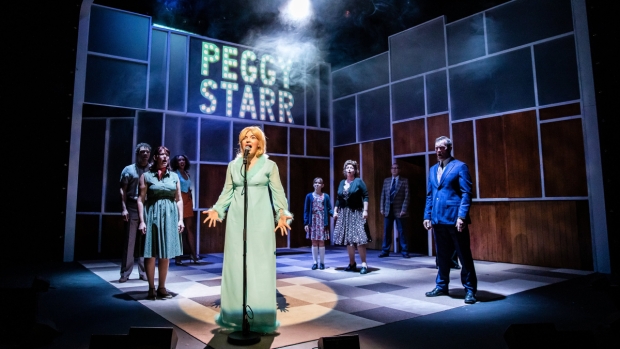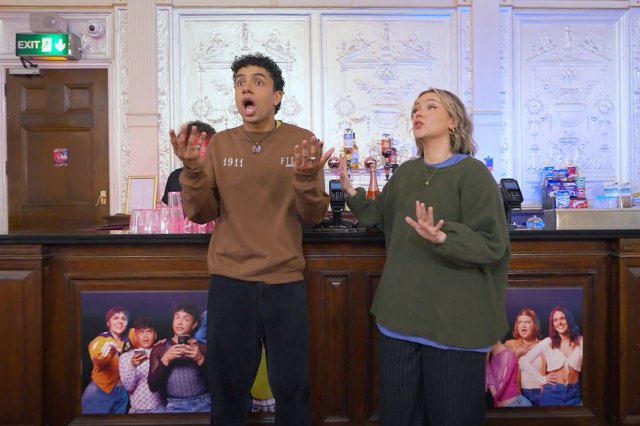”Are You As Nervous As I Am?” at Greenwich Theatre – review

© Pamela Raith
In a 12-month period that has given us Fantastically Great Women Who Changed The World, Ride and Great British Bake-Off The Musical amongst others, it would be smashing to report that the British musical continues its winning streak with this premiere from Simon Spencer (book), Leighton James House (music) and Shaun McKenna (lyrics). Unfortunately, that is not the case. Are You As Nervous As I Am? feels like a throwback to the bad old pre-Evita days of the ‘50s, ‘60s and ‘70s when there was a common perception that we Brits couldn’t really do musicals, and the artform was a mainly American phenomenon with quintessentially English period pieces like Oliver! and Half A Sixpence being the exceptions that proved the rule.
With a timeframe running from 1945 to 1975, and locations from Llanelli in South Wales to London’s West End then Vegas and LA (all rendered woefully samey in Kevin Jenkins’ ugly, angular set design), it’s billed as the tale of a pair of sisters estranged since childhood who then reconnect as adults just as the world opens up with more opportunities for women. In practise though, the show is a run-of-the-mill, rags-to-riches-back-to-rags saga centred on younger sibling Peggy (a hard-working Katie Elin-Salt) who escapes from their drunken harridan of a mother in the Welsh Valleys, to become a showbiz singing sensation with a chronic drink problem, despite the fact that all she really wants is a family.
Although director Phoebe Barran and movement specialist Denni Sayers are women, it feels slightly odd to have, in 2022, a female-driven story with an otherwise all-male creative team. It does, however, explain the two-dimensional nature of the principal female characters and the pervading whiff of misogyny: older sister Janet has little agency and is the victim of a particularly nasty drink-related incident (more on that in a bit), Peggy has few distinguishing characteristics beyond a tiresome inclination to bash out a mediocre number she’s just written every time she comes across an unattended piano (this happens a lot), while their mother is a vicious old soak who can’t keep her knickers on. Then there’s a predatory lesbian gossip columnist and a blousy nightclub chanteuse with designs on Peggy’s gormless second husband… It all feels as though it was written a couple of decades ago, as cliché piles on cliché, implausibilites abound, and the shuffling on and off of props, furniture and characters often takes longer than the actual scenes that are being set up. Book writer Simon Spencer works predominantly on television and the scrappy, episodic nature of the dramatic structure here feels more akin to a screenplay than a focused theatre piece. This is one of those musicals where the programme turns out to be a mixed blessing as, just when you think you can’t take much more, you check the running order and realise there’s still a half dozen songs and scenes to go before the interval.
Many of the songs start with a character, usually Peggy, “performing” a number, either on the telly or at a piano, which then expands into a running commentary on their offstage lives. Once or twice is fine, but the constant repetition of this format starts to feel like a lack of imagination. The music is pleasant but bland, and fails to capture anything of the flavour of the different decades during which the show is set. The lyrics are of the anything-for-a-rhyme school of writing, which at least means that you can relieve the tedium occasionally by betting with yourself what the end of the next line will be. A particular favourite of mine paired “bottom of the glass” with “fall on your arse”, but there are plenty of other howlers.
As a central character, Peggy Starr (the surname is allotted to her by her Svengali-like first husband and manager, a nasty piece of work acted with considerable relish and polish by Bill Ward) is an oddly blank figure: she has no particular desire to perform yet becomes a star anyway, she follows her long-lost sister to London but then doesn’t seem that bothered when they’re reunited. She abandons her career to accompany her second husband, who’s an actor, to Hollywood, then thinks it’s ok to turn up unannounced on his film sets. None of it makes much sense and, by the time she’s giving it the full late career Judy Garland (drunk as a skunk in front of heckling patrons in a Vegas night club), it’s pretty hard to care. Elin-Salt has a sweet voice but doesn’t quite convince as a once-in-a-generation talent that inspires hard-nosed showbiz types to drop everything to catapult her to stardom. She is also saddled with a couple of the worst wigs I’ve ever seen on a professional stage and is further ill-served by writing and directorial choices that require her to signal Peggy’s burgeoning sophistication by calling everybody “darling” whilst constantly whirling her pointing hands around in circles in a manner which will be familiar to anyone who remembers Victoria Wood as Miss Berta in Acorn Antiques.
Sister Janet is, if anything, even more underwritten, but Emma Thornett invests her with considerable presence and a beautiful singing voice. In what must surely be one of the most bizarre first act closers in the musical theatre canon, poor Janet is blinded while sticking up for her sister against her drunken brute of a husband. The staging of this is lamentably poor, involving screaming, a quick crouch behind a conveniently located sideboard to administer a hasty squirt of Kensington Gore in the face, and a fast blackout, leaving the audience blinking in disbelief. That disbelief turns to bewilderment in the second half as the long-term effects of Janet’s injury sink in. The RNIB logo appears on the back of the programme so one presumes they were consulted on this but it strikes me that having a sighted actress wobbling about with a white stick and a look of grim determination on her face, is maybe not the most enlightened and sensitive way to raise awareness of the issues surrounding sight loss. Arguably even worse is the moment when an exasperated Peggy refers to her sister as Helen Keller thereby making herself seem even more crass and less sympathetic than she did before. It’s another strange choice in a production stuffed with them.
It’s not the fault of the cast, all of whom display consummate professionalism and admirable commitment to the iffy material. West End veteran Sarah Ingram does sterling work in the thankless dual roles of the wayward Mam, pointlessly popping up periodically to wordlessly glower from the sidelines, and the journalist who takes up with Janet, and Simon Furness does what he can with the dated trope of the eternally faithful gay sidekick. Megan Donovan, one of a trio of alternating young performers, shows real dramatic and musical promise as Peggy as a child.
Stories of female solidarity can make powerful, uplifting viewing but not here, where the characters are so sketchily drawn and generally unlikeable, and any depth of feeling between the sisters barely makes it across the footlights. The show’s title is a quote from Peggy’s speech at the very end as she embarks, phoenix-like, on a comeback performance after a couple of years of obscurity in Port Talbot, but it bears no relation to anything else in the script. Barran’s staging is frustratingly short on urgency and detail, exemplified by an act two scene where Peggy has a drunken meltdown in the famed Covent Garden showbiz restaurant Joe Allen; the year, according to the programme, is 1974. Joe Allen didn’t open until 1977. Sadly, this misguided musical is exactly the sort of show whose poster one might expect to see on Joe’s notorious “flop wall”.














